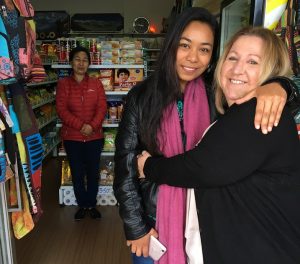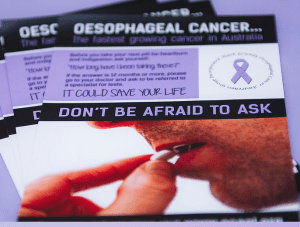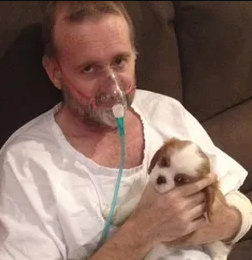
[dropcap]T[/dropcap]he beating heart of the quest for a cure for oesophageal cancer is right here in Campbelltown.
And it is powered by love.
The love of an woman, Polly Grundy, for her husband Mark who died just 12 weeks after being diagnosed with oesophageal cancer in 2012.
And the love of a local medical researcher, Prapti Shrestha, for Polly’s dedication to the campaign to conquer a cancer that’s a death sentence for most people who are diagnosed with it.
“Mark lasted 12 weeks from diagnosis – he was 48,’’ says Polly Grundy when we sit down to talk about this relatively unknown cancer.
“The first thing my boys said when we came home and told them dad’s got cancer was, it’s OK, cancer is not a death sentence anymore, and 12 weeks later dad’s gone.
“It was like a time bomb went off in him.’’
During those two 12 weeks Polly Grundy also discovered that oesophageal cancer was virtually an invisible disease.
There was no local website with information, no carers or support groups to contact for information, and even the Cancer Council had oesophageal cancer grouped under stomach cancers.
“When my Mark was diagnosed there was nothing,’’ says Polly now.
“We even tried to find support groups, nothing, and although I’ve got a big Italian family and they were absolutely fabulous, in terms of the disease it felt really isolated, there was just no one to talk to.’’
Once Mark passed away, Polly knew what she had to do and in June of 2012 the Mark Grundy Oesophageal Cancer Awareness Group Inc (OCAGI) was founded.
It includes a website chock full of information, including details on support groups and caring for people diagnosed with oesophageal cancer.
It also raises funds to be used in research – and that’s where Ingleburn resident Prapti Shrestha comes in.
“When we decided to fund some kind of research we thought, we have this fantastic university at our doorstep, Western Sydney University, by offering a PhD scholarship we’re going to get kids to look at it, because all kids look at the scholarships,’’ says Polly.
Prapti Shrestha, who had migrated from Nepal to Australia with her parents more than a decade earlier, was already doing medical research on another subject when the offer came in for an oesophageal cancer research scholarship over three years.
[social_quote duplicate=”no” align=”default”]“It’s all come down to Polly’s love for her husband, and it was meant to be,’’ says Prapti.[/social_quote]
“I was doing a different project and it was a tough decision to come on board this one, but I had a gut feeling, something told me to do it,’’ she says.
The two have got to know each other really well and the strong bond between them is obvious even though it was sheer coincidence their paths have crossed in such a way.
“I’m absolutely delighted and as I said to Prapti on many, many occasions, something in the universe has joined us, it was meant to fall into place,’’ says Polly during the interview.
 Oesophageal cancer is the fastest growing cancer in Australia and the eighth most common cancer.
Oesophageal cancer is the fastest growing cancer in Australia and the eighth most common cancer.
The five year survival rate from detection is just 13 percent and more than 80 percent of oesophageal cancer is diagnosed terminal.
“Ten years ago there would have been less than 500 people diagnosed, now we’re looking at 2,000,’’ says Polly.
The constant message from the OCAGI website and in any awareness programs on oesophageal cancer is: Don’t be afraid to ask.
That’s because – and that’s the good news – early detection is critical and can mean it may not be a death sentence.
“Forty years ago breast cancer was a death sentence, but those statistics have been turned around because of early detection,’’ says Polly.
[social_quote duplicate=”no” align=”default”]“And when it is detected early it is treatable.’’[/social_quote]
And that was precisely what the research grant has been devoted to, finding a way to detect oesophageal cancer as early as possible.
Prapti says there are encouraging signs her research will lead to a simple test that could detect the presence or otherwise of any cancerous cells in the oesophagus.
“The reason we started this research was to find early detection – so we have been trying to build an early diagnostic model for oesophageal cancer that would actually help to diagnose this cancer at an earlier stage,’’ she says.
“Working with an engineering group, we aim to create a breath test model that could actually be put on a trial at the hospitals, perhaps a gastroenterologist could perform the test on a patient.’’
As part of this, a sample of micro organisms will be obtained which can then be analysed for any signs of cancer.
“It usually all starts with a gastric or oesophagus reflux disease,’’ says Prapti.
“Whenever a patient is diagnosed with that doctors treat it with antacids, without going into some sort of tests; the patient comes back in two or three years with the same symptoms, it just keeps happening in cycles.’’
 Mark Grundy was finally diagnosed when he had difficulty swallowing his food, and by that time it was too late.
Mark Grundy was finally diagnosed when he had difficulty swallowing his food, and by that time it was too late.
What Polly would like to see is such a test brought in and used much earlier in the process.
“Had I access to some of the information available now he may have lived longer,’’ she says.
“There’s nothing good about oesophageal cancer, it’s hard to pronounce, hard to spell, it’s a really hard sell, there’s no government funding.
“But there’s still a lot of work to be done and it’s difficult for me, too, because there’s nothing tangible we can show when fundraising, like, for example, a bus to drive people with disabilities that costs so much, and the more money we can raise the more we’re able to do.
“There are 56,000 charities in Australia and there’s only one for oesophageal cancer.’’
For more information on Mark’s story and lots more information on oesophageal cancer visit the website, http://www.ocagi.org/
